Veneers in Cape Town
Search and Compare the Best Clinics and Doctors at the Lowest Prices for Veneers in Cape Town
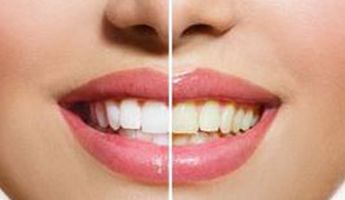
Find the best clinics for Veneers in Cape Town
With Medijump you can browse 9 facilities offering Veneers procedures in Cape Town. The cheapest price available is $270 in Johannesburg
Veneers in South Africa
Price: $ 270
Veneers in Johannesburg
Price: $ 270
Veneers in Cape Town
Price: $ 438
Vietnam offers the best prices Worldwide
Price: $ 1
From 61 verified reviews
David Jacobs, 23 September 2020
Very pleasant experience.Treated like a king. Had new dentures made.
From 18 verified reviews
Juliettash Stadler, 05 May 2020
My Son was admitted with a very rare autoimmune illness in April this year. The care he was given was superb Prof Dheda, Prof Louw and their team of specialists covered every possibility , diagnosed efficiently and treated effectively. There was time taken to explain everything. The Hospital Matron made allowances for me to spend as much as possible time with my son and also allowed for frequent visits from close family. Mr Daniel Mathew the Hospital General manager is very approachable and interested . The staff was friendly and helpful. Basically every one from reception through admin to ICU was friendly and helpful. I Highly recommend this hospital
From 36 verified reviews
Kim Adams, 30 March 2020
Overall I had a good experience.
Paradise Road Dental Practice, located in Syfred Douglas St, Cape Town, South Africa offers patients Veneers procedures among its total of 36 available procedures, across 2 different specialties. The cost of a Veneers procedure ranges from $438 to $573, whilst the national average price is approximately $489. There are many specialists available at the Dental, with 5 in total, and they have multiple recognized accreditations, including: HPCSA - Health Professions Council of South AfricaSADA - South African Dental AssociationSAAAD - South African Academy Of Aesthetic Dentistry
Medical Tourism SA, located in Syfred Douglas St, Cape Town, South Africa offers patients Veneers procedures among its total of 36 available procedures, across 2 different specialties. The cost of a Veneers procedure starts from $540, whilst the national average price is approximately $489. All procedures and treatments are undertaken by the lead specialist at the Hospital, and they are not accredited by any recognized accreditations institutes
From 1 verified reviews
Riaan Mastenbroek, 25 June 2019
Fantastic Dr and his bills are within most budgets!!
From 6 verified reviews
fisharn williams, 07 September 2020
Not the greatest experience. Double check that you are not charged twice on your medical aid..
Dr. Lindas Surgery and Associates - Limpopo, located in Syfred Douglas St, Cape Town, South Africa offers patients Veneers procedures among its total of 3 available procedures, across 2 different specialties. Currently, there's no pricing information for Veneers procedures at Dr. Lindas Surgery and Associates - Limpopo, as all prices are available on request only, whilst the national average price is approximately $489. All procedures and treatments are undertaken by the lead specialist at the Hospital, and they are not accredited by any recognized accreditations institutes
Dr Chodree, located in Syfred Douglas St, Cape Town, South Africa offers patients Veneers procedures among its total of 36 available procedures, across 2 different specialties. Currently, there's no pricing information for Veneers procedures at Dr Chodree, as all prices are available on request only, whilst the national average price is approximately $489. All procedures and treatments are undertaken by the lead specialist at the Hospital, and they are not accredited by any recognized accreditations institutes
- Home
- South Africa
- Cape Town
Compare Before & After Photos of _procedure_photos.phpVeneers
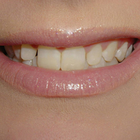
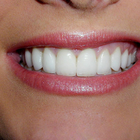
Front view
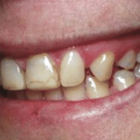
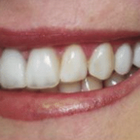
Half-side view
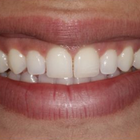
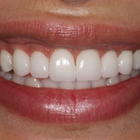
Front view
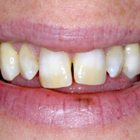
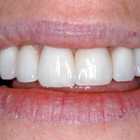
Front view
WHY US?
At Medijump, we're making medical easy. You can search, compare, discuss, and book your medical all in one place. We open the door to the best medical providers worldwide, saving you time and energy along the way, and it's all for FREE, no hidden fees, and no price markups guaranteed. So what are you waiting for?

Free

Best Price

Widest Selection

Risk-Free
What you need to know about Veneers in Cape Town

Dental veneers are thin covers that are attached to the surface of teeth to enhance their appearance. The non-invasive dentral procedure is previously popular among those with damaged or discolored teeth. Nowadays, however, the procedure is seen as the ideal method of achieving the ‘perfect smile.'
Veneers can be used to hide uneven, misaligned or simply imperfect teeth. The veneers are cemented over the existing teeth and fixed into place – there are two main types of veneer; Porcelain and Composite. Porcelain veneers are more expensive and appear more natural, being made in a laboratory so require multiple visits. There is often the need to alter the existing teeth, removing some of the mass. Composite veneers are made of the same materials used for cavity fillings. They can usually be made quickly, and are sculpted directly on the teeth instead of in a laboratory. Thus allowing the procedure to be done in a day.
What does a Veneers Procedure Involve?
Veneers are used primarily for aesthetics. This type of treatment procedure is perfect for people who have gaps in their teeth, stains, as well as people who may have chipped a tooth. Veneers are custom-made shells designed to fit the shape of your teeth and to be attached to your front teeth to improve the size, shape, color, and length.
Two main types of veneers are:
- Composite Veneer - this type can be created by your dentist on the same day and directly applied to your teeth. You will only need a single appointment to complete the procedure.
- Porcelain Veneer - this type is manufactured in a laboratory. Opting for a porcelain veneer will require you to have two appointments. First, is to prepare your teeth (enamel removal) and mold a model of your teeth to be created in the lab. The second is to finally cement your veneers onto your teeth.
The most commonly used type of Veneer is the Porcelain Veneer as it appears more natural and can resist stains better than composite veneers. Besides the two main types of veneers, some dentists may also offer no-prep veneers. These may include specific brands of procelain veneers like Vivaneers and Lumineers. They are less invasive to apply since the layers of tooth under the enamel aren't removed.
In terms of anesthetics, local anesthesia is not usually required while undergoing the whole procedure. However, depending on how you handle pain and discomfort, you may request to receive local anesthesia or sedation.
Aside from giving you a pleasing smile, veneers are resistant to staining and offer the best fix to broken or damaged teeth.
How Long Should I Stay in Cape Town for a Veneers Procedure?
This type of procedure is an outpatient treatment, meaning you may be able to go home after undergoing the procedure. However, you will be required to do a follow-up check-up with your dentist to assess the placement of your veneers and in most cases, the procedure has to be carried out over 2 separate occasions, just a day or two apart. Since this is a non-invasive treatment, stitches are not required, but you will be required to stay in Cape Town for at least a few days.
What's the Recovery Time for Veneers Procedures in Cape Town?
There is actually no recovery time after the placement of your veneers. You can also return back to your daily routines including exercise immediately after your trip. As for the enamel removal, you may experience some mild discomfort for about a week. It is best that you avoid very hot or cold foods, including hard, chewy or crunchy food. When your sensitivity wears off, you can return to your normal dietary habits.
What sort of Aftercare is Required for Veneers Procedures in Cape Town?
Once your dental veneers have been placed and you have completed the whole procedure, you should commit yourself to good oral hygiene, regular visits to your dentist and a good healthy lifestyle. Dental Veneers can last beyond 10 years now, however, just like your natural teeth, veneers are also still susceptible to damage. This is why aftercare is very important to help with the longevity of your new teeth.
What's the Success Rate of Veneers Procedures in Cape Town?
Over the past years, many studies have reported that over 91% of people who have had dental veneers experienced highly positive results. However, potential risks and side effects after undergoing this procedure are a possibility. Just like any other dental restoration, dental veneers can have some side-effects, for example:
- Tooth sensitivity - since this procedure will require the removal of some enamel, your teeth will become slightly sensitive, following the placement of your veneers.
- Response from gum tissues - your gum tissue might take some time to adjust to your newly placed veneers. Expect to have some minor inflammation and/or discomfort in your gums.
- Risk of trauma - once your teeth’s enamel is removed, it will become more sensitive, thus it will be even possible for the pulp within your teeth to die.
- Possible Issues with placement - it's possible for your teeth to have issues with decay or chipping along the outer portion of your veneers. Gum irritation may also be possible. Other problems may include rough-edged veneers and overhanging veneers.
- Overall Discomfort - experiencing some discomfort after the procedure is to be expected. If you are particularly sensitive, it is advisable that you take an over the counter medication to help you relax and treat your pain.
Are there Alternatives to Veneers Procedures in Cape Town?
You also have to be aware that this type of treatment option is not for everyone. If you are not a good candidate to undergo the procedure, note that there are still possible alternatives that will be suited for you. These alternatives may include:
Orthodontics - if you have severely crooked teeth or malocclusion, dental veneers are not for you. You may want to consider a more comprehensive orthodontic procedure to treat your case.
Dental crowns - these are quite similar to dental veneers. These are also custom-made to match the shape of your teeth. However, unlike veneers, a crown extends all the way around your tooth, meaning your dentist will remove a large portion of your dental structure. These crowns are perfect for patients who have considerable damage that affects the strength and structure of their teeth.
Bonding - often called composite veneers. This is typically for patients with an insufficient amount of tooth enamel.
Whilst the information presented here has been accurately sourced and verified by a medical professional for its accuracy, it is still advised to consult with your doctor before pursuing a medical treatment at one of the listed medical providers
No Time?
Tell us what you're looking for and we'll reachout to the top clinics all at once
Enquire Now

Popular Procedures in Cape Town
Prices Start From $1

Prices Start From $1

Prices Start From $48

Prices Start From $1

Prices Start From $1

Prices Start From $1

Prices Start From $11

Prices Start From $45

Recommended Medical Centers in Cape Town for Veneers

- Interpreter services
- Translation service
- Religious facilities
- Medical records transfer
- Medical travel insurance
- Health insurance coordination
- TV in the room
- Safe in the room
- Phone in the room
- Private rooms for patients available

- Interpreter services
- Translation service
- Religious facilities
- Medical records transfer
- Medical travel insurance
- Health insurance coordination
- TV in the room
- Safe in the room
- Phone in the room
- Private rooms for patients available

- Interpreter services
- Translation service
- Religious facilities
- Medical records transfer
- Medical travel insurance
- Health insurance coordination
- TV in the room
- Safe in the room
- Phone in the room
- Private rooms for patients available

- Interpreter services
- Translation service
- Religious facilities
- Medical records transfer
- Medical travel insurance
- Health insurance coordination
- TV in the room
- Safe in the room
- Phone in the room
- Private rooms for patients available

- Interpreter services
- Translation service
- Religious facilities
- Medical records transfer
- Medical travel insurance
- Health insurance coordination
- TV in the room
- Safe in the room
- Phone in the room
- Private rooms for patients available

- Interpreter services
- Translation service
- Religious facilities
- Medical records transfer
- Medical travel insurance
- Health insurance coordination
- TV in the room
- Safe in the room
- Phone in the room
- Private rooms for patients available

- Interpreter services
- Translation service
- Religious facilities
- Medical records transfer
- Medical travel insurance
- Health insurance coordination
- TV in the room
- Safe in the room
- Phone in the room
- Private rooms for patients available

- Interpreter services
- Translation service
- Religious facilities
- Medical records transfer
- Medical travel insurance
- Health insurance coordination
- TV in the room
- Safe in the room
- Phone in the room
- Private rooms for patients available

- Interpreter services
- Translation service
- Religious facilities
- Medical records transfer
- Medical travel insurance
- Health insurance coordination
- TV in the room
- Safe in the room
- Phone in the room
- Private rooms for patients available

- Interpreter services
- Translation service
- Religious facilities
- Medical records transfer
- Medical travel insurance
- Health insurance coordination
- TV in the room
- Safe in the room
- Phone in the room
- Private rooms for patients available
Veneers in and around Cape Town
About Cape Town
Cape Town is the legislative capital of South Africa and is also known as the Mother City. It is the oldest city in the country and home to the Parliament of South Africa and is a major destination for immigrants and expatriates, making it one of the most multicultural cities in the world. Located on the shore of Table Bay, the city is known for its harbor, natural setting, as well as famous attractions and many tourists, visit to enjoy Table Mountain and Cape Point.
Recently, tourists also come to the city for its medical tourism. Many groundbreaking procedures and medical research in South Africa, such as the world’s first penile transplant, have put Cape Town under the radar of medical tourists from all around the globe. Thanks to its world-class healthcare and world-renowned medical practitioners, more and more people now prefer Cape Town as their medical destination. The healthcare in the city is among the best on the African continent. Other reasons such as shorter waiting times for surgeries, state-of-the-art equipment, and affordable healthcare compared to Europe and the United States, and English-speaking doctors.
Popular Areas in Cape Town
Cape Town is a natural beauty that offers a wide range of things to do and see. From culture, food, art, to nature. Listed below are some of the more popular places in the city:
- Table Mountain is one of the New 7 Wonders of Nature and it is easy to see why. The iconic mountain makes an amazing backdrop to Cape Town. The level plateau is about 3 kilometers from side to side with remarkable cliffs on the edges. The peak offers an amazing view of the city. Tourists can choose to board the cable car or discover its beautiful nature by hiking.
- Cape of Good Hope is situated within the Table Mountain National Park. The area has a mix of bio-diversity and wonderful beauty that attracts thousands of tourists to visit. There are around 250 species of birds spotted in the area. Hiking and cycling through it is the best way to discover its true majesty. Tourists can picnic and birdwatch in isolated beaches.
- Kirstenbosch National Botanical Garden is one of the most incredible botanic gardens in the world. Nestled at the eastern foot of Table Mountain, it features a natural forest and fynbos flora and sprawls around 528 hectares. The garden displays a collection of diverse South African plants with seasonal festivals such as musical sunset concerts during summer and craft markets on the last Sunday of every month.
- Groot Constantia is the oldest wine-producing estate in South Africa, located in the suburb of Constantia. The estate consists of a museum, restaurants, tasting room, and cellars. The museum was built in Cape Dutch architecture style, further into the estate; tourists will find the free orientation center which provides an overview of Groot Constantia history. Tourists can also tour the original wine cellar, have a wine tasting, or a wine and chocolate pairing.
- Boulders Penguin Colony is located in Boulder Beach on the outskirts of Simon’s Town. The beach boasts fine white sand with pristine waters and endangered African penguin colonies. Tourists can set up camp, see the penguins up close, and even swim along with the magnificent aquatic birds. Observing the penguins socializing and playing in the waves is a perfect way to enjoy your travel in Cape Town.
Weather and Climate in Cape Town
Cape Town enjoys a warm Mediterranean climate. The summer is dry and warm, lasting from early December to March. The average maximum temperature during this season is around 26 °C, and the minimum is 16 °C. The Berg Wind that arrives from February to early March can make the city uncomfortably hot for a couple of weeks.
The winter starts in June and ends in August and the season is characterized by mild and wet weather. The city also experiences strong north-westerly winds during this season. The average temperature ranges between 8.5 °C at the lowest and 18 °C at the highest.
Getting Around in Cape Town
The primary airport that serves Cape Town is the Cape Town International Airport and it is the second busiest airport in South Africa and the fifth busiest in Africa. The airport serves direct domestic flights to major cities and several small centers in the country. It also connects the country with major cities in Africa, Europe, the Middle East, and Asia. It is the hub for South African Express as well as budget airlines such as Mango and FlySafair.
There are several types of taxis: the metered taxis, Rikkis Taxis, and minibus taxis. The metered taxis can be a little expensive but are usually comfortable. Tourists can order one via a phone call or from one of the city’s official taxi stands. Tourists should always choose reputable taxi companies such as Marine Taxi, Unicab, Excite, and SA Cab.
Rikkis Taxis are painted yellow and very popular and these taxis run on a fixed fare rather than metered, so they are a little more affordable than metered taxis and a good option if you are traveling on longer journeys. Other than the Rikkis Taxis, tourists can choose the minibus taxis which are perfect for adventurous foreign travelers. The minibus taxis can be found practically everywhere and are very cheap, however, you will need to know exactly where your destination is and tell the driver when to stop. Another travel option is the MyCiTi bus, a modernized and effective bus system.
Tourist Visas in Cape Town
There are more than 60 countries listed in the visa exemption agreements, which means the citizens of these countries can stay in South Africa for up to 90 days. Other countries not listed must obtain a valid visa to enter the country. A Medical Treatment Visa is available for medical tourists. Note that all visitors must hold a passport valid for at least 30 days after the expiration of their intended visit.
Additional Information
- Local Currency: South African Rand (ZAR) is the official currency and 1 USD converts to 14 ZAR.
- Money & Payments: Tourists can find ATMs almost everywhere around the city, but you should avoid ATMs in secluded places, especially at night. Credit cards are accepted in established restaurants, hotels, and shops. It is always better to carry some cash because smaller food places are cash-only. Tipping is expected here.
- Local Language: The most common languages in the city are English, Afrikaans, and Xhosa with Afrikaans as the most widely spoken home language.
- Local Culture and Religion: The population follows Christianity, Islam, Judaism, and several other religions.
- Public Holidays: There are 12 official public holidays in Cape Town, including New Year’s Day, Freedom Day, and Christmas.
Popular Searches
- Plastic Surgery in Thailand
- Dental Implants in Thailand
- Hair Transplant in Thailand
- Breast Augmentation Thailand
- Gastric Sleeve in Thailand
- Gender Reassignment Surgery in Thailand
- Laser Hair Removal in Bangkok
- Botox in Bangkok
- Dermatology in Bangkok
- Breast Augmentation in Bangkok
- Coolsculpting in Bangkok
- Veneers in Turkey
- Hair Transplant in Turkey
- Rhinoplasty in Turkey
- Stem Cell Therapy in Mexico
- Rhinoplasty in Mexico
- Liposuction in Mexico
- Coolsculpting in Tijuana
- Rhinoplasty in Korea
- Scar Removal in Korea
- Gastric Sleeve in Turkey
- Bone Marrow Transplant in India
- Invisalign in Malaysia
- Plastic Surgery in the Dominican Republic
- Tummy Tuck in the Dominican Republic
- Plastic and Cosmetic Surgery in Poland
- Rhinoplasty in Poland
- Hair Implant in Poland
- Dental Implants in Poland
- IVF in Turkey




